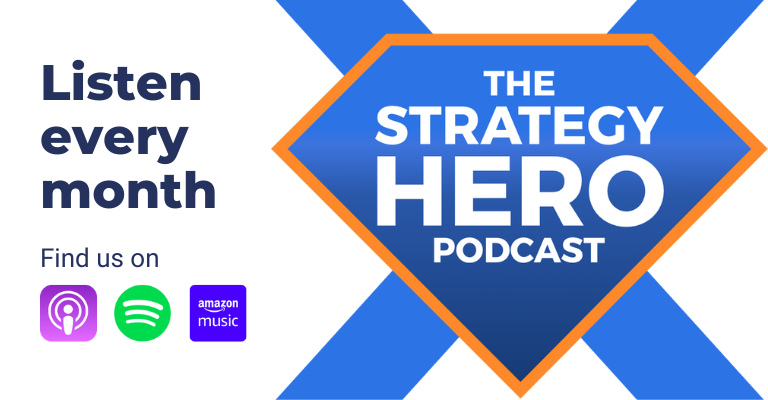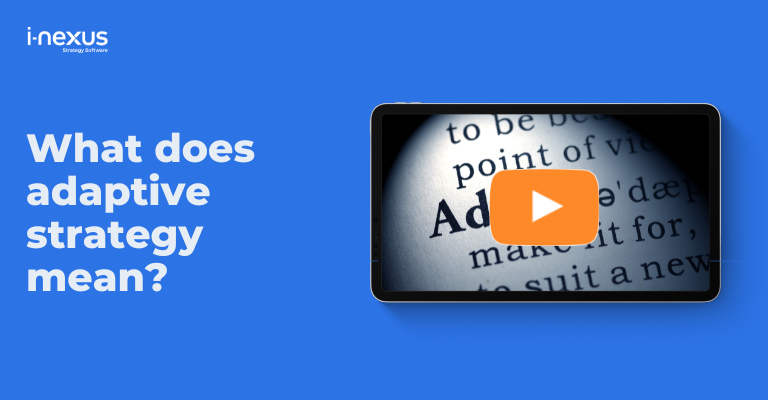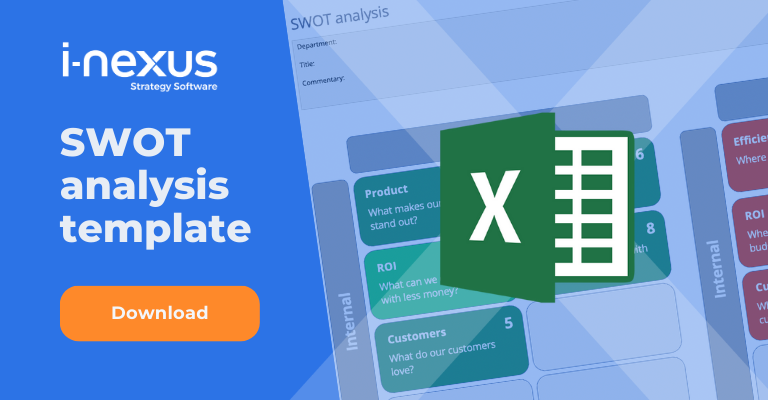As we prepared our topics for season one of “Strategy Hero,” we knew that one area we had to dive into was the actual creation of strategy. To do that, I turned to mentor, friend, and i-nexus' very own Chief Product Officer, James Davies, whose passion for this topic is second to none.
Back on a warm day at the end of April 2021, James Davies spoke to me about the concept of Adaptive Strategy. Excited about his breakthrough, he spent the duration of our phone call explaining how he envisioned the world of strategy execution adapting to the "new normal" that COVID-19 had created.
Fast forward almost two years later, James' passion has only grown stronger for this concept, and he has written thousands of words about how this works in practice.
As we prepared our topics for the debut season of "Strategy Hero," I knew this was the perfect time to put this idea in front of you, our audience.
Here's what I took away from my time with James and our fourth episode, "8 steps to a winning strategy."
It’s important to note that my opinions do not reflect those of i-nexus or James Davies.
Enjoy!
Why strategy creation?
Throughout the pandemic, we've seen plenty of companies succeed and fail. Businesses didn't, even when life returned to some semblance of normal.
The reality was that COVID-19 had accelerated a shift in buying habits, hardened ethical views, and forced companies to take a long, hard look at how they were giving their customers value.
I had long felt that COVID-19 was, through the eyes of business, nothing new in so far as a seismic shift in the market. It was in the same ballpark as the 2009, 1991, 1982, and 1975 recessions (and so on).
While the pandemic is no longer raging, it has had a lasting impact on how businesses operate. The alternative was extinction.
But have strategy, transformation, and departmental leaders changed their ways when it comes to strategy?
With this question in mind, we turned to James Davies.
“In the last two years the agenda has shifted from how do we best execute our strategy to what is our strategy.”
Is it time to change the game?
James' opening views surrounded the idea that the first step towards creating a winning strategy is to think critically about the possibility of annual strategic planning no longer being fit for purpose.
And I think there's something here when we look at the impact of COVID-19. The pandemic has been an accelerant in a lot of ways for businesses.
Every concept inevitably comes to its natural fork in the road - adapt or die.
For strategic planning on an annual cycle, if your plan kicked off on Jan 1, 2020, two months in that plan was neutered and thrown to the side.
The pace of change hasn't slowed down. Sure, it's changed shape - sometimes it's buying habits, other times it's regulatory changes, and others it's something like remote and hybrid working. Change isn't slowing down; it isn't going anywhere. The winds of change are now gusts.
That was a bold claim by James. Much like our Lean episode with Pascal Dennis, in which Pascal argues businesses need more than efficiencies and improvements, James stated that in a decade, we'll be in a place where the idea of reviewing and tweaking strategies every quarter won't be out of choice, but necessity.
As you'll hear, that bold claim is one which he backed up throughout the episode.
Learn more about the emergence of Adaptive Strategy in the 2030s with our webinar:
Is it time to change the tools?
Listening to James, I believe that sound, logical management tools like PDCA still have their place in a shorter strategy cycle; it's more that we, as leaders, must be able to embed these into our reviews more frequently.
The challenge is that once hearts and minds are won, the crucial question is how to create an easy-to-use and easy-to-access process and accompanying tools that enable lighting fast strategy review and adaptation.
“Bigger organizations in particular are going to struggle. This transition's not going to be easy for a lot of companies, but it's going to be critical if they're going to survive.”
The challenges of adapting how we create strategy
As the episode continued, I enjoyed getting into the hurdles that are standing in the way of embracing a more adaptive way of creating and reviewing strategy, namely:
- Complexity
- Uncertainty
- Data
- Time
- Skills
Here are some highlights I took from his explanation.
Complexity
Everything is changing. Whether it's your business's internal structure, the software your teams use, or larger industry forces - there's more than ever for leaders to understand, navigate, and wrestle with to ensure we achieve our goals.
Uncertainty
Typically, we see uncertainty as a negative. Don't.
Uncertainty can be good, whether it's a new product innovation from your R&D team, regulatory influence to open up markets to more entrants, or supply chain changes creating a new competitive advantage.
The key is to understand and gauge the impact of potential changes, and then plan for these scenarios.
Data
Data is the currency of almost every great decision. But gathering and monitoring information on your market and competition is challenging. Where do you get the data from, and then how do you break it into chunks that are easy to understand and lead to valuable output?
And that's to say nothing about how tough it can be to have multiple people in the business gathering and analyzing this data for their segments, for example, and bringing this work together in a coherent format.
That's a lot of data barriers.
Time
Taking ourselves away from execution is almost unimaginable. When so much value in a strategy is lost through poor execution, we've long been taught to keep our eyes on the ball when it comes to doing the work.
So, suddenly there's an extra demand on our time, and it's mission-critical like strategy setting? That's daunting. I can confirm from experience that it's a very challenging task to balance the two without the processes and tools that could make it doable and not too taxing.
Skills
There's a reason that companies turn to consulting partners to build their strategy. They're impartial and have the know-how for tools like PESTEL, SWOT, VRIO, and the Five Forces.
Arguably, if you've not been exposed to the tools and frameworks we use for strategy creation, tackling these new time-sensitive tasks will be overwhelming at best.
The reality is that we need to empower more individuals in more businesses to understand and effectively use these tools - like our SWOT template pack below:
My takeaway
The inevitable question in this episode is how this will work in practice.
To that point, James offered a pragmatic first step: increase the frequency of your strategy reviews.
I feel that's a reasonable request and one that I've taken on board with my strategy.
It's akin to an exercise plan. If you start big with your first sessions, you're almost certain to lose steam, interest, and commitment to the process. Don't overload the beginning.
For example, schedule a quarterly meeting.
In this meeting, invite subject matter experts, leaders, and anyone else who adds value to a strategy review session.
Assign ownership of monitoring your risks, opportunities, threats, and assumptions for your market and discuss the potential impact of each. Walk away with some actions. Follow up. Rinse and repeat.
Here, it's all about starting small. That was a key message I took away from the episode.
For more on how you can take this first step, I strongly encourage you to read the below supporting content from James:
- ROTA: the easy-to-follow process to manage strategic issues
- Why you should follow this process for strategic reviews
- What is strategic drift?
- What does Business Agile mean?
- What does Adaptive Strategy really mean?
Listen back to the episode
James' episode was the fourth of six in our opening season of Strategy Hero.
You can listen to James' episode here or search "Strategy Hero podcast" wherever you find your favorite podcasts.
About Strategy Hero
Published on the last Thursday of every month, the Strategy Hero podcast delves into the world of business strategy and transformation.
Each cast shines a spotlight on a Strategy Hero – inspirers, boundary pushers, and leaders of change from all walks of life – armed with practical advice on achieving your goals.
Episodes explore topics around operational excellence, Lean management, process improvement, change management, and much, much more. Available where all great podcasts live, listen on-demand today, and discover the Strategy Hero inside you.
About the host
James Milsom is Head of Marketing at i-nexus, but James is a storyteller. He’s the UK’s biggest Georgia Bulldogs fan (Go Dawgs!) and lives and breathes marketing.
The Strategy Hero podcast is his opportunity to bring some of his conversations with mentors, inspirers, and people anew to you every month.
He’s behind the content read and watched by people like you and lives to educate and help others.
If you’d like to learn more about him, connect with him on LinkedIn and subscribe to the Strategy Hero podcast today!





.jpg?width=352&name=KPIs%20(3).jpg)